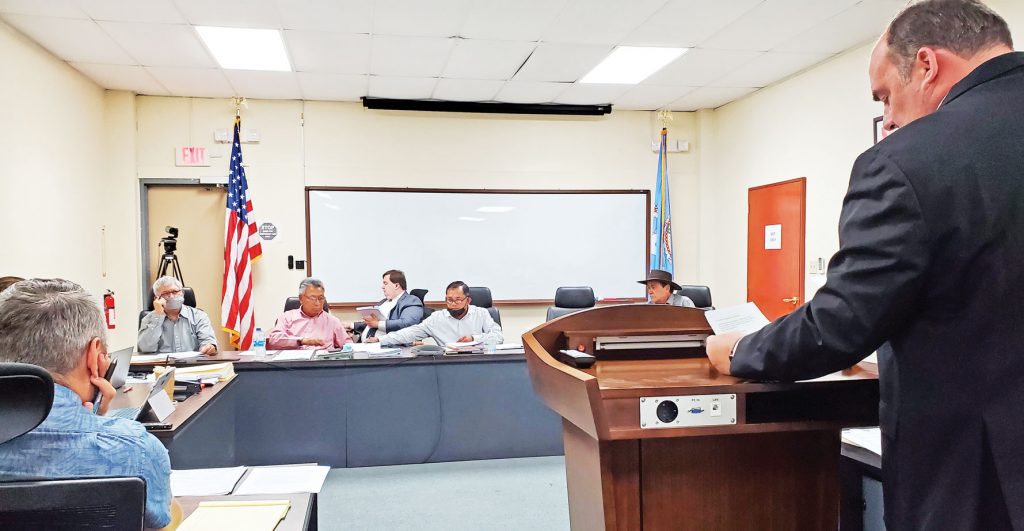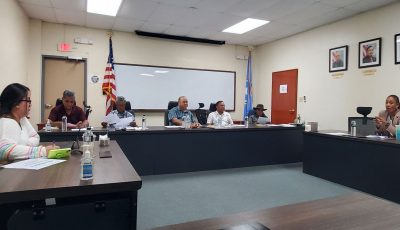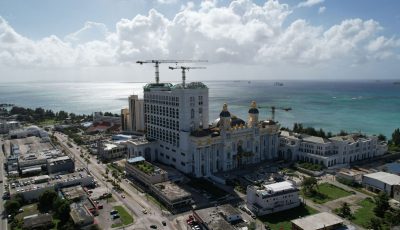IPI doesn’t oppose suspension of casino license

Assistant attorney general Michael Ernest, counsel for Commonwealth Casino Commission executive director Andrew Yeom, argues before the CCC commissioners during an evidentiary hearing yesterday afternoon in the two consolidated Yeom’s complaints against Imperial Pacific International (CNMI) LLC. The hearing was held after IPI and Yeom failed to reach a global agreement that will settle all five complaints.
(FERDIE DE LA TORRE)
Imperial Pacific International (CNMI) LLC does not oppose having the Commonwealth Casino Commission suspend its casino gaming license, admitting to failing to pay the $40 million community benefit fund money in 2018 and 2019 and failing to pay the $15.5 million annual casino license fee by the Aug. 12, 2020, deadline, as required by the Casino License Agreement.
IPI, through counsel Tiberius Mocanu, informed the CCC board of the company’s position, during an evidentiary hearing on the CCC executive director’s two consolidated complaints against IPI yesterday afternoon at the CCC office in Gualo Rai.
The CCC board held the hearing after IPI and CCC executive director Andrew Yeom failed to reach a global agreement to settle CCC’s five complaints against IPI.
CCC board vice chair Rafael Demapan, who presided over the hearing, placed the matter under advisement after listening to the lawyers’ arguments.
The other panel members are commissioners Diego M. Songao, Mariano Taitano, and Ramon M. Dela Cruz. Board chair Edward C. Deleon Guerrero recused from the two consolidated cases. John P. Lowrey, the chief of the Office of the Attorney General’s Civil Division, appeared as counsel for the CCC board.
IPI senior vice president of Marketing and Public Affairs Tao Xing sat beside Mocanu to represent IPI at the hearing.
In IPI’s closing arguments, Mocanu said that IPI sets no conditions in order to regain its exclusive gaming license in the future if the commission decides to suspend it. What IPI is asking, Mocanu said, is for the commission to create a structure in order for IPI to regain its seat at the table and be a responsible member of society.
“You create benchmarks that are reasonable and help us succeed, not ones that are punitive and ensure destruction,” the lawyer told the commissioners.
Force majeure or no, no one is arguing that the $15 million for the gaming license is due and that it needs to be paid, he said. “It’s a question of when and under what circumstances. So if we’re going to create benchmarks for IPI, regaining this gaming license, if this commission so decides to suspend it, then take the $15 million that was due is obviously a prerequisite…” Mocanu said.
He said what he would ask from the commission is not to impose fines—the hundreds of thousands of dollars that are in addition to the obligation that are already set by law.
“It’s going to be a fight for IPI to make good and get its license back. To make that fight even more difficult doesn’t make any sense,” the lawyer said.
Mocanu urged the commissioners that when they deliberate and consider these violations, to keep in mind that it’s in the best interest of IPI that the commission create a structure where IPI is not rewarded for failing and that its violations are not overlooked.
Mocanu said he remembers that when the casino was first coming, he was excited and the community was excited. IPI did come in and did a lot of good things in the community, among other things, including paying for people’s power utilities.
“You could go still in the lobby and have nice drink. And that the dragon was there. People got jobs and families prosper. That’s not the IPI today,” the lawyer pointed out.
Mocanu said the company is not in a financial situation to pay that license. “That’s very clear,” he said.
Mocanu said he believes force majeure is applicable.
However, he said, between the violations today and the violations that are coming up next week at the hearing of the three other complaints, the commission will take some serious actions.
“I think IPI needs to take a beat and regroup and get itself together and come back to the table when it’s ready to be a contributing and responsible member of this community. And in order to do that, IPI doesn’t oppose the suspension of this gaming license,” Mocanu said.
In CCC executive director Andrew Yeom’s closing arguments, his lawyer, assistant attorney general Michael Ernest said there are no triable facts and no issue of material facts because IPI stipulated to certain facts that are not disputed by the parties.
Ernest said IPI admits, among many things, that it has not paid the annual license fee in full for the year beginning Aug. 12, 2020, through Aug. 11, 2021.
Ernest asked the commission to declare that IPI committed the violations as alleged in the two complaints and suspend the company’s gaming license for six months.
He asked the commission to order IPI to pay a fine of $50,000 per major violation or for a total of $100,000, and another fine of $50,000 per violation per day for the annual license fee that went unpaid.
“I suppose they can ask for leniency. But the short of it is it’s our job to provide you with the evidence and the law. And it’s your job to figure out what you want to do with it,” he said.
Ernest said he believes that they have given the commission ample statutory and regulatory basis for the four major claim violations.
He said the executive director would ask that the commission impose the maximum monetary penalties for each of those violations.
Ernest argued, among other things, that there’s no evidence that says IPI can’t pay because of the force majeure clause.
“They had no witnesses. Their own auditors said that they were in horrible trouble the year before COVID even started,” he said, adding that the force majeure clause legally doesn’t apply for this payment. Ernest said if it does, it factually has not been proven.
Ernest pointed out that then-IPI chief executive officer Donald Browne admitted that they did have some money to pay. “Their CEO admitted we have some money to pay the license fee. COVID didn’t stop that. Where’s that money?” Ernest asked.
The complaints against IPI include IPI’s failure to pay the $3.1 million regulatory fee that was due last Oct. 1; IPI’s failure to comply with a CCC order directing it to settle in full any payable or contribution owed to a public or private entity and immediately pay any debt owed to any private entity which is more than 89 days old; faiure to comply with the minimum capital requirements of CCC’s order, among other issues; failure to pay the $15.5 million casino license fee by the deadline last Aug. 12; and failure to contribute $40 million in Community Benefit Fund money in 2018 and 2019.



























